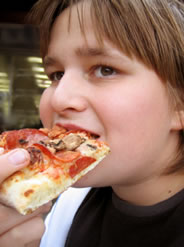Published: November 26, 2007
Study finds boosting kids’ confidence deflates materialism on the cusp of adolescence
When ‘tweens beg for a pair of Hollister jeans or “Guitar Hero” for the holidays, they’re asking for more than an item of clothing or electronics. They’re trying to shore up their self-esteem.
Much has been written about how kids on the cusp of adolescence lose the confidence of childhood and enter a phase of insecurity and selfconsciousness. A new study from the University of Minnesota links those feelings to a spike in materialism at the same age. The good news for parents is that materialism seems to decline in later adolescence. The study also found that a simple boost to self-esteem can dramatically decrease materialism in kids of all ages.
Researchers have probed the link between self-esteem and adult consumer behavior, but an article published today in the Journal of Consumer Research is one of the first to look at how materialism changes over time in kids. [continue reading…]
Published: November 26, 2007
Cambridge researchers have discovered that individuals with obsessive compulsive disorder (OCD) and their close family members have distinctive patterns in their brain structure. This is the first time that scientists have associated an anatomical trait with familial risk for the disorder.
These new findings, reported today in the journal Brain, could help predict whether individuals are at risk of developing OCD and lead to more accurate diagnosis of the disorder.
[continue reading…]
Published: November 23, 2007

Image Credit: iStockphoto
New research from the University of Bristol shows that children aged between 5 and 7, whose mothers work full time, are more likely to be overweight at age 16. The impact on their weight is not immediate; rather, children become more obese as they get older. There is no evidence that children younger than 5 or older than 7 are more likely to be overweight at age 16 if their mothers work either part time or full time. [continue reading…]
Published: November 23, 2007
According to new research from the University of Bristol, some fathers do not provide their young sons with the same quality of intellectual stimulation as mothers do. Boys who spend at least 15 hours a week in their father’s care as toddlers perform worse in academic assessments when they start school. [continue reading…]

